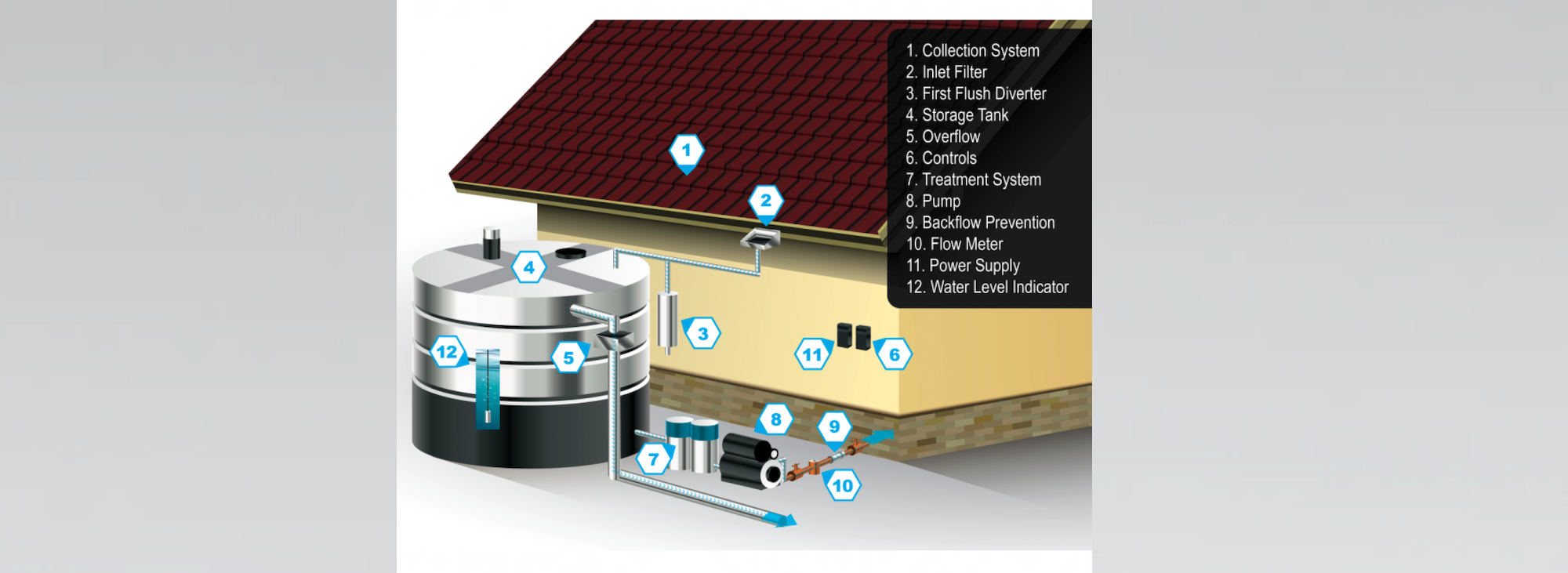ASSE/ARCSA/IAPMO/ANSI Series 21000-2022, Professional Qualifications Standard for Rainwater Catchment Systems Personnel, has been designated as an American National Standard by the American National Standards Institute (ANSI).
Now available for purchase, the standard was first published in 2017 by ASSE International and the American Rainwater Catchment Systems Association (ARCSA) to address an increasing number of residential, commercial, and industrial rainwater and stormwater systems being installed. The standards within Series 21000 establish best practices and uniform minimum requirements for qualified designers, installers, and inspectors of viable alternative water systems utilizing captured rainwater or stormwater.
Program guidelines and a series of exams have been created for the certification of rainwater catchment system installers, designers and inspectors. The standard complements ARCSA/ASPE/ANSI 63, Rainwater Catchment Systems, and ARCSA/ASPE/ANSI 78, Stormwater Harvesting System Design for Direct End-Use Applications.
“Today, 42.4% of the U.S. and 50.7% of the lower 48 states are in drought. Properly designed, installed, and inspected rainwater catchment systems can help replace the use of potable water for irrigation and allow for watering landscaped and gardened areas during times of drought,” said Kurt Steenhoek, United Association (UA) international representative and ASSE Series 21000 Working Group chairperson. “These systems can help bring water to areas that have development restrictions, depleted ground or surface water sources, or infrastructure that is unable to deliver suitable water quantities or qualities.”
Related Stories
Smart Buildings | Jul 1, 2024
GSA to invest $80 million on smart building technologies at federal properties
The U.S. General Services Administration (GSA) will invest $80 million from the Inflation Reduction Act (IRA) into smart building technologies within 560 federal buildings. GSA intends to enhance operations through granular controls, expand available reporting with more advanced metering sources, and optimize the operator experience.
Sustainability | Jul 1, 2024
Amazon, JPMorgan Chase among companies collaborating with ILFI to advance carbon verification
Four companies (Amazon, JPMorgan Chase, JLL, and Prologis) are working with the International Living Future Institute to support development of new versions of Zero Carbon Certification.
K-12 Schools | Jul 1, 2024
New guidelines for securing schools and community spaces released by the Door Security and Safety Foundation
The Door Security and Safety Foundation (DSSF), in collaboration with Door and Hardware Institute (DHI), recently released of “Are Your Door Openings Secure?.” The document provides guidelines to equip school administrators, building management personnel, and community leaders with a clear roadmap to create a secure and safe environment.
Codes and Standards | Jun 27, 2024
Berkeley, Calif., voters will decide whether to tax large buildings with gas hookups
After a court struck down a first-in-the-nation ban on gas hookups in new buildings last year, voters in Berkeley, Calif., will have their say in November on a measure to tax large buildings that use natural gas.
Sustainability | Jun 24, 2024
CBRE to use Climate X platform to help clients calculate climate-related risks
CBRE will use risk analysis platform Climate X to provide climate risk data to commercial renters and property owners. The agreement will help clients calculate climate-related risks and return on investments for retrofits or acquisitions that can boost resiliency.
MFPRO+ News | Jun 24, 2024
‘Yes in God’s Backyard’ movement could create more affordable housing
The so-called “Yes in God’s Backyard” (YIGBY) movement, where houses of worship convert their properties to housing, could help alleviate the serious housing crisis affecting many communities around the country.
Codes | Jun 17, 2024
To avoid lawsuits, contractors and designers need to do more than comply with codes
Climate change is making design and construction more challenging and increasing the potential for lawsuits against building teams, according to insurance experts. Building to code is not enough to reduce liability because codes have not kept up with the rapid climate changes that are making extreme weather more common.
Concrete Technology | Jun 17, 2024
MIT researchers are working on a way to use concrete as an electric battery
Researchers at MIT have developed a concrete mixture that can store electrical energy. The researchers say the mixture of water, cement, and carbon black could be used for building foundations and street paving.
Codes and Standards | Jun 17, 2024
Federal government releases national definition of a zero emissions building
The U.S. Department of Energy has released a new national definition of a zero emissions building. The definition is intended to provide industry guidance to support new and existing commercial and residential buildings to move towards zero emissions across the entire building sector, DOE says.
Green | Jun 11, 2024
Tool helps construction and renovation projects with CalGreen compliance
One Click LCA recently launched a new software tool to help building teams comply with Part 11, Title 24, of the California Code of Regulations—CALGreen. The regulation is the nation’s first state-mandated green building code to include embodied carbon emission control as a mandatory component, effective from July 1, 2024.

















